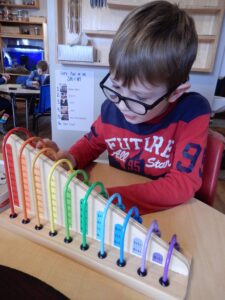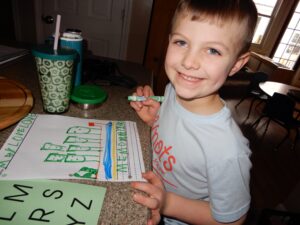When numbers allow, we love offering an extra year of Wee Friends as an additional year of pre-k or as a kindergarten year. We prioritize our acceptance decision of children who are aged 5 by September 1st on:
- Ensuring we can accommodate all of the toddler classroom children who are ready to move into the preschool classroom.
- A review of the child’s behavior and disposition during the current year. Children with ongoing behavior challenges will not be eligible for the kindergarten aged child extra year extension.
- Family goodness of fit with our kindergarten curriculum and program overall.
- Order in which reenrollment requests are returned to us.
In 2006, Wee Friends began offering a kindergarten year or extra year of pre-k to parents who expressed they were not ready for their kindergarten aged child to say goodbye to our safe, loving, supportive, comfortable, and developmentally appropriate learning environment. When numbers allow, we have continued to offer this additional year at Wee Friends option because we understand it is helpful in a child’s readiness to begin more traditional instruction where they are expected to begin learning abstractly. When 5 year old children are asked to learn information in a large group setting and sit at a desk before they are physically and intellectually ready, their love of learning is compromised and their learning stagnates. Our 5-year-olds flourish socially, emotionally, and intellectually in our active integrated curriculum and exit our program with the inner peacefulness that helps them move into their next step of education seamlessly.

Mindy Shephard, who has been with Wee Friends since January 2012, leads our kindergarten program. Mindy uses her elementary education degree from Indiana University, along with her many years of experience to design a truly developmentally appropriate learning environment for our kindergartners. Mindy’s understanding of how to optimize children’s learning, along with our Framework for Academic Balance (FAB) curriculum, creates a one of a kind individualized academic program for your child.
As a multi-age classroom, the number of older children in our classroom varies from year to year, but on average we will accept 0-4 children each fall to continue with us for their kindergarten year. Because our kindergarten class is small, Mindy is able to customize each lesson to the individual level and interests of each child participating. With such targeted lessons, our children can accomplish a lot of learning in short targeted lessons which always leaves plenty of time for play. Research has shown over and over that ample amounts of play is essential for kindergartners to develop socially, emotionally, creatively, physically, and intellectually and rigid academics pushed down from first grade only serves to inhibit learning rather than enhance it.
Our FAB cycles begin each September and include math and literacy goals over a 12 week time frame. In addition to science and social studies topics that arise as emergent curriculum, there are built in science and social study standards that occur in the intervals between the 12 week mathematic and literacy cycles.
Here is what the FAB will look like on a daily basis for our kindergartners:

- Daily kindergarten sign-in: Each morning, there will be a message in the sign in binder that will focus on the academic standards for the week. The message is targeted where the children are developmentally as well as provide a structured activity to start their morning.
- Daily kindergarten activities: Kindergartners will be invited to participate in activities that are specifically geared towards the academic standards for the week. We will continue to guide the children through our emergent curriculum and will incorporate the standards to make them as fluid and meaningful to the student as we can. These activities could range from working on a specific math skill to diving into a story and working on dissecting that story. Most of the time, the kindergartners will be working with each other during this time. However, depending on the developmental appropriateness of the work being done, older preschoolers may be involved as well. Most days on the blog, we include a separate kindergarten section that will go into some detail as to how we worked the given FAB into our day.
- Daily journaling: Every day after large group time, our kindergartners will be offered the opportunity to journal. This time allows for children to work on their writing/drawing skills, language development, and later, when ready, it will be targeted phonics instruction. In journaling, children always start by drawing a picture on their journal page. Then they use their words or writing to describe the picture they drew. In the beginning stages, the child will dictate their words for the teacher to spell. Next, they will begin to write words with teacher support. Lastly, children will work towards ‘kid spelling’, hearing letters on their own and forming words. This process will form naturally for kindergartners. We support our kindergartners wherever they are at in their reading and writing development.
- Bob Books: Reading is not a skill to be rushed. In a high quality educational setting, good readers develop naturally through the building blocks of reading (listening to stories, journaling, letter activities, playing with sounds, environmental print, etc.). We are ready to support our new readers with ‘Bob Books’ when they show readiness for this next step. Readiness would be the child showing a solid understanding of consonant sounds and a beginning understanding of vowel sounds. As the children journal, we will be watching for these signs of readiness and will begin to offer Bob Books when your child is developmentally ready. If decoding is pushed before readiness, the child becomes frustrated rather than excited about their reading journey.
- Extensions of play: Our kindergartners will be involved in the same activities as their preschool peers including woodworking, music and movement, art, dramatic play, and block building. While they are involved in these given activities, our kindergartners may be asked to extend their play. For example, if there’s a structure being built in the block building area of the classroom, they may be asked to go grab a clipboard and a piece of paper along with a pencil and draw the structure. Our reading and writing skills will grow this way through meaningful extension activities such as this.
- Leadership roles: With the prestige of being kindergartners also comes the responsibility of having a leadership role in the classroom. They may be asked to lead a group song or help their younger peers with tasks such as helping with shoes and/or jackets. Helping their peers as well as their teachers will help increase self-esteem in our kindergartners.
Bibliography of articles/books that have influenced the development of our kindergarten:

Berliner, Wendy. “’Schools Are Killing Curiosity’: Why We Need to Stop Telling Children to Shut up and Learn.” The Guardian, Guardian News and Media, 28 Jan. 2020, www.theguardian.com/education/2020/jan/28/schools-killing-curiosity-learn.
Brown, Christopher. “We Need to Make Kindergarten Engaging Again.” Psychology Today, Sussex Publishers, 27 Nov. 2018, www.psychologytoday.com/ie/blog/the-fundamentals/201811/we-need-make-kindergarten-engaging-again.
Dotson-Renta, Lara N. “Why Do Schools Stifle Kids’ Movement?” The Atlantic, Atlantic Media Company, 19 May 2016, www.theatlantic.com/education/archive/2016/05/why-young-kids-learn-through-movement/483408/.
Gentry , Richard. “5 Reasons Why Writing Helps Early Reading.” Psychology Today, Sussex Publishers, 15 Sept. 2013, www.psychologytoday.com/us/blog/raising-readers-writers-and-spellers/201309/5-reasons-why-writing-helps-early-reading.
Gentry, Richard. Raising Confident Readers: How to Teach Your Child to Read and Write, from Baby to Age 7. Perseus Books, 2010.
Gray, Peter. “Kindergarten Teachers Speak Out for Children’s Happiness.” Psychology Today, Sussex Publishers, 12 Nov. 2019, www.psychologytoday.com/ie/blog/freedom-learn/201911/kindergarten-teachers-speak-out-children-s-happiness?fbclid=IwAR2wZwgfLvK8dUcDNzUzitdjmtu89E5VMrxP9bQBZKFJ7MJMbB7keFcewlY.
Hill, Denise. “Children Develop Better When You Let Them Be Bored, Psychologists Say.” Lifehack, Lifehack, 16 Nov. 2016, www.lifehack.org/419154/children-develop-better-when-you-let-them-be-bored-psychologists-say.
Kaplan, Emily. “What’s Lost When We Rush Kids Through Childhood.” Edutopia, George Lucas Educational Foundation, 23 Aug. 2019, www.edutopia.org/article/whats-lost-when-we-rush-kids-through-childhood?fbclid=IwAR0c2IoYmRq9aO-vUNbTREAiUyoPshJ9o6KQ4pETvkwR2rrFffgWNBdzJJc.
Learning to Read and Write: Developmentally Appropriate Practices for Young Children. A Joint Position Statement of the International Reading Association and the National Association for the Education of Young Children, 1998, www.naeyc.org/sites/default/files/globally-shared/downloads/PDFs/resources/position-statements/PSREAD98.PDF.
Long, Katherine. “What Happened When Schools Used Science to Revamp How Reading Is Taught.” The Seattle Times, The Seattle Times Company, 30 Nov. 2019, www.seattletimes.com/education-lab/what-happened-when-schools-used-science-to-revamp-how-reading-is-taught/.
Mesmer, Heidi Anne E. “There Are Four Foundational Reading Skills. Why Do We Only Talk About Phonics?” Education Week, 4 Mar. 2020, www.edweek.org/ew/articles/2020/01/24/there-are-four-foundational-reading-skills-why.html.
Mongeau, Lillian, et al. “How Play Is Making a Comeback in Kindergarten.” The Hechinger Report, 11 Feb. 2020, hechingerreport.org/play-based-kindergarten-makes-a-comeback/.
Peak. “Why Learning to Write Comes Before Learning to Read.” Medium, Medium, 24 Jan. 2017, medium.com/@peaklabs/why-learning-to-write-comes-before-learning-to-read-ccdd517a13b6.
Schwartz, Sarah. “The Most Popular Reading Programs Aren’t Backed by Science.” Education Week, 3 Dec. 2019, mobile.edweek.org/c.jsp?cid=25919951&rssid=25919141&item=http%3A%2F%2Fapi.edweek.org%2Fv1%2Few%2Findex.html%3Fuuid%3D4E279912-1128-11EA-99F7-8AF258D98AAA&cmp=SOC-SHR-FB.
“The Sixth and Seven Senses: The Vestibular and Proprioceptive Systems.” Eyas Landing, 28 Aug. 2019, eyaslanding.com/the-vestibular-and-proprioceptive-systems-the-sixth-and-seven-senses/.
